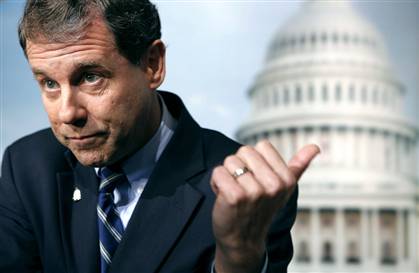Friday Free For All: Howard Stern Edition
by PubliusYesterday, Howard Stern informed listeners that he would never again vote for a Democrat, saying they “are communists.” If you’ve lost Howard Stern…
1. $940 billion health care overhaul vote Planned for Sunday
2. Dems Refuse up-or-down vote on Senate Health Care Reform Bill
3. Rep. Lynch (D-MA): Dem's 'slaughter' strategy 'disingenuous,' harms credibility of Congress...
4. Rep. Altmire (D-PA): 'Absolutely against' slaughter rule...
5. ...Lynch, Altmire vote with Dems
6. Roll Call: Special Deal for Dem Rep. Conrad in Reconciliation Bill?
7. Fund: Don't Ask, Don't Tell, Don't Vote, Don't Debate
9. Obama signs $38 billion jobs bill
10. CBO Prelim Score: Health Care Reform Bill Would Cut Deficit
11. CNS: CBO Reports federally approved health insurance plan to cost $12k+ per family per year
12. Obamacare may pick up two more votes after CA water deal
13. Obama grilled by Bret Baier in Fox News Exclusive...
14. Big Journalism: Baier Shows Why Obama Has Been Dodging FOX News
15. Idaho, Virgina to sue if residents forced to buy health insurance
16. Shock Poll: Boxer Trails GOP Challenger Campbell in CA Senate Race
Yesterday, Howard Stern informed listeners that he would never again vote for a Democrat, saying they “are communists.” If you’ve lost Howard Stern…
In yet another admirable display of the right kind of Attorney General activism, Virginia AG Ken Cuccinelli has put House Speaker Nancy Pelosi on notice that what she and the Democratic leadership are reportedly scheming to pass Health Care ‘reform’ is not only wrong — it’s unconstitutional.
Amidst discussion and arguments surrounding health care reform, is the effect passage will have on the re-election of Democrats in the Fall. The health care reform legislation currently in front of Congress is so widely unpopular on both sides of the aisle that Democrats have taken up the idea for a process called, “deem and pass” to get health care reform passed through.
Deem and pass is a process by which House Democrats will be able to avoid taking recorded votes on the Senate health care bill. Given the political environment and discussion within the blogosphere and mainstream media, the motives behind enacting this process specifically for this bill are highly transparent.
In a letter to the Speaker, above, Cuccinelli wrote, “A bill of this magnitude should not be passed using this maneuver. As the President noted last week, the American people are entitled to an up or down vote.” (He’s not exaggerating when he talks of the “magnitude” of this bill. It’s said to project up 2.5 trillion dollars in new spending).
“Based upon media interviews and statements which I have seen, you are considering this approach because it might somehow shield members of Congress from taking a recorded vote on an overwhelmingly unpopular Senate bill.”
I am calling to all of you freedom-loving Americans to come once again to Washington D.C. to gather at upper Senate Park, across from the Capitol on Saturday, at 12 o’clock noon.
We must come by the thousands.

Speaker Pelosi will stop at nothing to fulfill her corrupt conquests. She will bring all of the corrupt ACORN liars to try to bully all the Democrats that may be having pangs of guilt knowing quite surely what their votes can and will do. If they’re bullied into saying “yes,” it will destroy America.
Join me and Rep. Michele Bachmann in Washington DC at 12 noon EST so we can give all the Democrats who know what the end result will be the courage to say: “No, do not pass this destructive bill.” (more…)
Transcript:
SEN. TOM COBURN (R), OKLAHOMA: I want to send a couple of messages to my colleagues in the House.
If you voted no and you vote yes, and you lose your election, and you think any nomination to a federal position isn’t going to be held in the Senate, I’ve got news for you. It’s going to be held.
Number two is, if you get a deal, a parochial deal for you or your district, I’ve already instructed my staff and the staff of seven other senators that we will look at every appropriations bill, at every level, at every instance, and we will outline it by district, and we will associate that with the buying of your vote. So, if you think you can cut a deal now, and it not come out until after the election, I want to tell you that isn’t going to happen. And be prepared to defend selling your vote in the House.
Below is the just-released text of the House Reconciliation Bill. In the strange, ‘through the looking glass’ world that is the House Democrat Leadership, they will vote for these “fixes” to the Senate passed health care bill. In voting for these fixes, the House will ‘deem’ that the Senate Health Care bill is passed. See, the Democrats can vote for the fixes without having to vote for the bill that is being fixed.We already knew they don’t have to read bills to pass them. Now, they don’t have to vote for them either.
The Senate, then, will dutifully enact all of these “fixes,” by using elaborate procedural tricks and at least a couple votes to override the Senate Parliamentarian. Right, like that is going to happen.
Somebody nominate Bret Baier for a Pulitzer! There has never been a more revealing interview with Candidate or President Obama and after yesterday, there likely won’t be one again.
The president found his conversation with Baier “frustrating” because it focused too much on “process” for his taste. The irony is, if Obama’s Democratic colleagues supported his health care take-over, process wouldn’t be an issue. They don’t and thus it is. So it is important because it shows the leadership will change the rules in order to get what they want.
But the president proved Glenn Beck’s argument that the fundamental transformation of America has begun.
“We’re not transforming one-sixth of the economy all in one fell swoop,” Obama told Baier.
This implies that what is being bandied about is only the beginning, not the end. And that pattern of thought has emerged from Washington with similar statements from Sens. Tom Harkin and Sherrod Brown.
It is likely what persuaded Rep. Dennis Kucinich to flip from a ‘no’ to a ‘yes.’
It’s not often that we can give credit to Barney Frank but when it comes to the issue of Financial Reform at least we can say is he was honest enough to put a price tag on the proposed permanent bailout fund. Can’t say the same for Sen. Chris Dodd.

The Frank bill’s price tag for future bailouts was clear — $4 trillion.
Sen. Dodd’s bill proposes the same bailout authority but makes matters even worse — he leaves the check blank. Taxpayers will be on the hook for any amount.
Dodd’s bill gives the Fed “emergency lending authority” to “any “ entity or market utility, program or facility that the Financial Stability Oversight Council determines is or is likely to become “systemically important.”
But don’t worry. They have to report back to Congress why they used this authority within seven days after they use it. But– they only have to disclose who they helped “within one year” and only if they deem that it won’t hurt the “effectiveness of the program”
Still thinking maybe this isn’t a bailout? Well, on page 1306, one of the requirements is that the Fed has to report to Congress “ the expected or final cost to the taxpayers of such assistance.”

Here is an idea: Greece is getting ready to sell some of its assets to pay for its gigantic debt (Corfu and the Parthenon are not on the auction block yet), and the US should do the same. According to the Financial Statement of the United States, there is about $2.6 trillion of stuff we could sell (See Page 49 of the report, it’s page 69 of the whole document). A few items on my list:
Loans receivable and mortgage backed securities: $540 billion
TARP direct loans and equity investments: $240 billion
Property, plant, and equipment: $784 billion
Freddie and Fannie preferred stocks: $65 billion
I would add California, New Jersey and maybe New York: $500 billion (The three states have a lot of debt and many high maintenance people living there so I am not sure how much we can get for them).
What’s on your list?
We recently stumbled across a Stimulus construction sign in an upscale neighborhood on the North Shore of Chicago. Recovery.gov describes the project as follows:
ILLINOIS DEPARTMENT OF TRANSPORTATION
Highway Infrastructure Investment Grant: Urbanized Areas over 200K PopulationAward Amount: $1,320,000
Reported Jobs: 4.66
We produced a short video asking the question: Does the upscale suburb of Evanston really need the hard-earned tax dollars of people from other states across the union in order to (re)build her local roads?
House Speaker Nancy Pelosi plans to force a vote on the health care bill this week, and people need to contact their representatives to urge them to vote “No.” This legislation will force tax increases, it will increase the cost of health care and it will force cuts to Medicare benefits. If that wasn’t enough, the House leadership is resorting to procedural tricks to pass legislation that most Americans don’t want. It’s just bad medicine.
Organizing for America (formerly Organizing for Obama) has a Health Reform Action page which encourages members to write a letter to the editor. After typing in your zip code you get a list of local news outlets with radio buttons you can click:
The next page gives you a large comment box to compose your letter and in the sidebar are a list of suggested talking points:
Today, in 1766, the British Parliament repealed the hated Stamp Act. Good to remember that the repeal of bad laws is possible.

After World War II, Cleveland was booming, thanks to its leadership role in heavy industry and a business-friendly climate. Today, the city’s high taxes and onerous regulatory demands make it nearly impossible for new businesses to set up shop while choking the life out of existing companies. While relatively laissez-faire cities such as Houston are growing even during the current recession, Cleveland remains stuck in a rut. How can city officials make the city a more welcoming place for entrepreneurs to thrive?
Reason Saves Cleveland with Drew Carey is written and produced by Paul Feine; camera and editing by Roger Richards and Alex Manning; narrated by Nick Gillespie; music by the Cleveland band Cats on Holiday.
From today’s LA Times:
Faced with the daunting prospect of being significantly outspent by his Republican opponent, Democratic gubernatorial candidate Jerry Brown spoke to a labor group Tuesday and urged them to go on the offensive.
“We’re going to attack whenever we can, but I’d rather have you attack,” Brown said at a gathering of the California delegation of the Laborers’ International Union of North America in Sacramento. “I’d rather be the nice guy in this race. We’ll leave [the attacks] to … the Democratic Party and others.”
Tucker Bounds, a spokesman for GOP candidate Meg Whitman, said Brown’s pitch was unseemly and perhaps even illegal. (more…)
The always impressive John Kass in today’s Chicago Tribune:

Not even three or four pipes full of Hopium could have convinced me that the Congress of the United States would ever start looking like the Chicago City Council.
But now, with the Chicago Way White House twisting arms for its federal health care legislation, Democrats in Congress and Chicago aldermen are beginning to share a remarkable resemblance.
They’re starting to look like fall guys.
“The Congress? They’re acting like aldermen. Like fall guys. And we know all about fall guys in the city of Chicago,” said Jim Laski, a former Chicago alderman and former federal inmate who is now a WGN radio talk show host.
When President Obama hit the campaign trail in an attempt to sway Dennis Kucinich (yes, he’s reaching so low in the barrel, he’s trying to convince Dennis Kucinich), the administration began its full-court press on its allies.

As has been said here and elsewhere a zillion times: the American people don’t want what the Democrats are offering. But an acknowledgement by Ohio Sen. Sherrod Brown on the Rachel Maddow Show gives an even better reason to oppose the legislation: it’s simply a wedge in the door to a “public option.” From a Monday appearance:
MADDOW: Should we not expect the public option anytime soon?
BROWN: No. Just—Rachel, you know history. I‘ve seen your show enough to know that you understand sort of how progressive—the progressive movements worked. When we passed, what, Social Security was passed in the ‘30s. It wasn‘t all that great at the time. When Medicare was passed, it was good, but not great.
… That‘s what happens here. This—you can bet that a lot of us are going to introduce a public option bill.
Surprise, surprise. Sen. Chris Dodd’s financial-regulation proposal raises the possibility of substantial progress on the road to ending “too big to fail” (TBTF) and bailout nation for banks and other financial institutions.

How the Dodd bill will play out in the final details remains to be seen. But when you read the Dodd fact sheet, there are a few key items to like.
First, under the Dodd scheme, large complex companies will have to submit plans for rapid and orderly shutdowns should they go under. These are called “funeral plans.” Then, in terms of these orderly shutdowns, the bill would create an “orderly liquidation mechanism for the FDIC to unwind failing systemically significant financial companies. Shareholders and unsecured creditors will bear losses and management will be removed.” Good.
Then comes the “liquidation procedure.” This spells out that the Treasury, FDIC, and Federal Reserve must all agree to put companies into the orderly liquidation process. “A panel of three bankruptcy judges must convene and agree — within 24 hours — that a company is insolvent,” the bill goes on to say. It also states that the largest financial firms will be assessed $50 billion for an upfront fund that will be used if needed for any liquidation. This is a kind of debtor-in-possession safety net for the bankruptcy-liquidation process. Also good.
Finally, under the heading of bankruptcy, the bill stipulates that most large financial companies are expected to be resolved through the normal bankruptcy process. This is the key. However, it is not an airtight case for bankruptcy. It is possible that a government-resolution process could keep big banks alive or in conservatorship, such as with Fannie and Freddie. That would be wrong. Very wrong. In fact, one of the flaws in the Dodd bill is that there is no mention of Fannie and Freddie.

The Beatles had it best when they sung about the Tax Man.
Now my advice for those who die (taxman)
Declare the pennies on your eyes (taxman) ‘Cause I’m the taxman,
Yeah, I’m the taxman. And you’re working for no one but me.
But Massachusetts’s residents in the second congressional district might be surprised to know that they are working for Congressman Richard E. Neal (MA-2) and that he, rather than working for them, is working for the Irish.
Unfortunately, before long, we’ll likely all be working for him, as Mr. Neal plans to seek the chairmanship of the Ways and Means Committee now that the ever corrupt and cantankerous, Charlie Rangel, has stepped down.
With Rangel gone, Neal seems the likely pick for Pelosi. According to The Washington Post’s database, Neal has voted with Nancy Pelosi’s 111th Democratic Congress 98.9 percent of the time, tying him for third place.
Unfortunately for Neal and fortunately for Republicans, this record ties him to one of the most liberal and profligate congresses in American history. At at time of recession, Neal wants to raise, not lower, taxes.
This week will be a defining moment for Congress and our country. As Democratic leaders map out their health care end game, we as elected officials have a choice to make: Will people control their lives, or will government?

The stakes of the health care debate are clear. On the table is a bill that would put the federal government in charge of one-sixth of the American economy and, perhaps even more stunningly, the way Americans get medical care. Yet far too few Americans realize there is another government takeover in the offing – this one in how Americans pay for college.
First, some history. Since 1965, the Federal Family Education Loan Program has helped tens of millions of students and parents by providing low-cost, federally guaranteed loans. This public-private partnership offers students and schools choice and competition among loan providers, as well as essential value-added benefits such as college outreach, debt management and financial literacy.
For these reasons, FFELP has consistently been the more popular choice among colleges and universities. It leverages the innovation and competitive forces of the private sector with congressionally mandated benefits and protections that keep interest rates and fees low.
Yet right now, the Majority in Congress and the President want to make it more difficult to pay for college by putting the government between you and the money you need to pay for higher education.